The New Generation’s Ramadan
By Jannah Said
America is a melting pot, but oftentimes we find the different “groups” somewhat less-than-melted. Today’s American-Muslims often face identity crises as they struggle to search for equilibrium between the “Muslim” aspect of their lives and the “American” aspect of their lives, and often feel the two cannot be dually present. However, the festivities, rituals, and regimens of Ramadan often push us out of our comfort zone, in the sense that our dual identity often feels exposed. Our generation faces a new and unprecedented era of the experience of Muslim life in America.
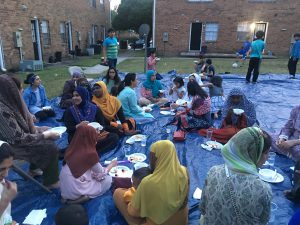
Our parents have told us endless stories of Ramadan experiences in the motherland: community events, school days off, fireworks, feasts — and they do their best to replicate their fond childhood memories despite living in a secular society where we are in the minority. We decorate our houses with fairy lights and lanterns, and we often attend Iftar (meal to break the fast at sundown) parties on weekends.
Our parents, who grew up in predominantly Muslim countries, lived in an accommodating society that allowed them to place the hustle and bustle of everyday life on hold during the month of Ramadan. However, the new generation of Muslims is offered no relief from the business of their schedules. When my father was growing up in Egypt, his parents, like most others, were given substantially shortened workday hours during Ramadan. In fact, many jobs even gave employees vacation during the month. Today, my parents’ work schedule in Ramadan is no different than their regular schedule. They see patients from 8 A.M. until 6 P.M., rarely leaving any time or energy to cook Iftar. As a result, they often pick up food from a nearby restaurant or heat up leftovers. In Muslim countries where work days are shortened in Ramadan, the family spends a great portion of the day cooking together, so they may break their fast at night and enjoy a spread of various cultural and traditional favorites.
The Islamic calendar follows a lunar calendar, rather than the traditional Gregorian calendar. Each month’s duration is determined by the length of time passed during a complete moon cycle. Therefore, the Islamic year is shorter than the Gregorian year, causing Ramadan to begin approximately eleven days earlier each Gregorian year.

This year is the first I can remember in which Ramadan has occurred wholly during the school year. On one hand, the timing is favorable because as Ramadan shifts nearer to winter, the hours of fasting– time between sunrise and sunset– decrease. On the other hand, I tend to find fasting during the school year somewhat of a struggle. My obligation to wake up at 5:30 each morning in order to catch the bus to school creates a bit of an obstacle in my fasting schedule. This year, sunrise has been around 5:45 A.M. The question arises: Do I wake up at 4, eat, and then try to go back to sleep for an hour? Do I eat and then stay awake? Or do I sleep as much as possible and sacrifice the opportunity to eat in the morning? Despite my parent’s efforts (and my stomach’s), I chose the latter option for most of Ramadan.
My early alarm induced a series of other difficulties, as well. When Ramadan occurred in summer, I and my fellow Muslims confess to having spent much of the day sleeping in as a means of quickening the day and avoiding pangs of hunger. Sleeping in also remedied the long nights of prayer, late-nights spent eating, and liveliness that occurs after the fast is broken. Now, in addition to the usual teenage sleep deprivation, we suffer the fatigue of malnutrition and exhaustion caused by late nights.
It is no secret that we high schoolers suffer from short attention spans and a chronic inability to concentrate. The symptoms increase exponentially when a student is running on little-to-no- food and little-to-no sleep — an issue that becomes threatening during exam season and the chaos of an ending school year. Additionally, homework often becomes a much more unforgiving task as we collapse for an after-school nap or try to soothe a headache.
School lunches are not the easiest environment for a fasting teenager, who sits and watches friends munch on sandwiches and chips. End-of-year parties are even worse, and it is truly a test of willpower to refrain from joining classmates to feast on cookies and brownies. Last week, my chemistry teacher asked us to bring canned sodas to class for a lab. The next morning, soda in hand, I walked into class only to learn that the lab required us to drink the soda. I explained to my teacher that I was fasting and could not drink the soda, and she allowed me to use my lab partner’s data instead. I left the can of soda with my teacher in case any student had forgotten to bring one.
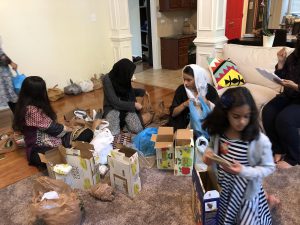
While my Ramadan is certainly different than the Ramadan my parents knew growing up, no amount of homework or class parties can hinder the spirit of community and the personal growth I experience. My mother never fails to remind me, “Ramadan is not just about being hungry.” The test of resisting outward temptation forces us to look inward and be grateful for all we have access to. We give charity, do volunteer work, visit our neighbors and family, and attend communal prayers late into the night. Growing up, it’s tradition for my sisters, father, and I to help my mother with her annual Eid Toy Drive, and deliver the toys to refugee homes and St. Jude’s Children’s Hospital. She and her nonprofit organization TAMAM– Triangle Association of Muslim American Mothers– also host an annual Iftar in a refugee neighborhood.
Despite the challenges, obstacles, and identity crises we face as teenage Muslims in America, the entire community looks forward to Ramadan. We may not have the same experiences as our parents did, but the Muslims in America continue to go above and beyond in creating a Ramadan for the new generation, and keeping alive the traditional spirit of the month.
Not Even Water: Ramadan Through the Eyes of a Muslim High-Schooler in America
by Sarah Jumma
As the school year comes to a close, Muslims around the world will celebrate the beginning of the holy month of Ramadan. During this month, adherents of Islam will fast from dawn to dusk and abstain from cursing, smoking and other sinful behavior that may negate the reward of fasting. Ramadan also provides Muslims with a chance to find inner peace, reflect on their actions and devote themselves to their faith once again. In the western world, the rituals of Ramadan are viewed as foreign and puzzling; however the purpose and events of the month are quite simple.
The Moon Sighting
Muslims follow the lunar calendar, so the month of Ramadan never begins on the same date every year. The month of Ramadan is the ninth month in the Islamic calendar and is one of the Five Pillars of Islam. The holy month typically lasts between twenty-nine to thirty days which is the amount of time from one visual sighting of the crescent moon to the next. After a month, the next crescent moon brings the celebration of Eid al-Fitr — a holy day filled with prayers, feasting, spending time with family and exchanging gifts.
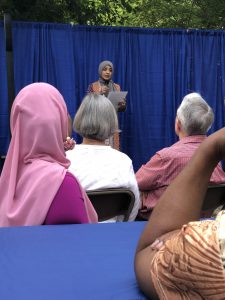
The First Week
The first week of Ramadan is usually the toughest as the body attempts to adapt to the lack of food and water. During this week, a fasting person may feel dehydrated and extremely hungry. Fatigue is also common due to the lack of nutrients and sleep due to Suhoor (pre-dawn meal). Nausea, dizziness and irritability are common side effects of the first week.
The Second Week
As the second week approaches, the body adapts to the sixteen hour fast. Symptoms that are relevant to the first week begin to fade and waking up before dawn to eat becomes an easier task. Prayers outside of the five daily prayers are recommended, and Muslims make a greater effort to read the Qur’an (the holy book of Islam). Charity is crucial in Islam and beneficial especially in Ramadan through Zakat which is also one of the Five Pillars of Islam. Zakat is obligatory and requires a fixed percentage of a person’s savings to be given to the poor.
The Third Week
By the third week, the fasting becomes a routine. The body becomes accustomed to the hunger and the side effects from the first week have completely subsided. During this week, it is important to remember people who can not fast, such as the elderly, the sick, people who are traveling, women who are pregnant/breastfeeding or menstruating. A sense of weakness and fatigue becomes prevalent.
The Fourth Week
The fourth week is the most difficult weak mentally as Eid al-Fitr looms around the corner. During this week, a Muslim will feel the weakest. Nights are spent praying and reading the Quran. During the fourth week, Laylat al-Qadr (the night of power/decree) occurs which is the night that Muslims believe the first revelation of the Quran was sent to Muhammad. This night is the holiest night of the year and generally falls in the last ten days of Ramadan.
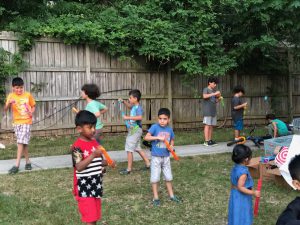
Eid al-Fitr
Eid al Fitr falls on the first day of the month of Shawwal and is the only day of the year where Muslims are not permitted to fast. Eid celebrations often begin in the morning when families head to the mosque to pray a special prayer. Other social gatherings within the Muslim community may take place as well. Eid al-Fitr is about feasting and gift giving (Eidi is a gift of money given to young children by adults). It is common to wear perfume and new clothes on this day practice to apply henna the night before the celebration.
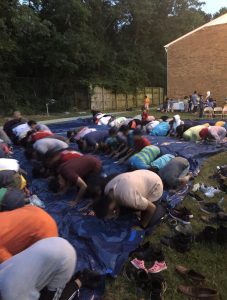
As an American Muslim, Ramadan is a difficult holiday. The days are long and hot as we attempt to reflect on ourselves and practice patience. In countries with a Muslim majority, Ramadan is a well-known practice, but this is not the case in the United States. Peers and coworkers gape at the idea of going without food and unintentionally judge the beautiful religion of Islam as cruel. This is not the case. Ramadan is one of the holiest (and often favorite) month for Muslims as it allows us to reflect on our actions and our religion. Food and water is the basis of human life and after achieving control with what you consume, every other task becomes effortless. Ramadan also allows family members to eat two meals together, every day at the same time which is uncommon today.
Ramadan has its tribulations, but the month is beneficial mentally and physically. Fasting promotes chastity and humility and denounces sin as it also includes abstaining from ignorant/indecent speech, arguing, and fighting. Believers strive to purify their souls with their actions and increase their good deeds. This purification of the soul brings a Muslim closer to God and strengthens his relationship with his religion. Physically, Ramadan leads to lower levels of cholesterol, reduced bodily inflammation, enhances heart health and boosts brain functions. Ramadan is the holiest month of the year for Muslims, and it aids them to become the best Muslim — physically and mentally — they can be.
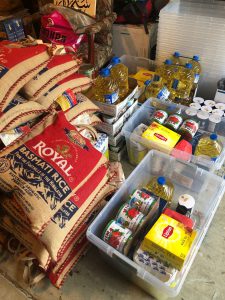
Leave a Reply